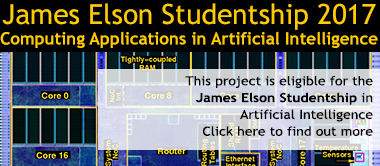Automatic Activity Analysis, Detection and Recognition
Primary supervisor
Additional information
Contact admissions office
Other projects with the same supervisor
- Automatic Emotion Detection, Analysis and Recognition
- Generative AI for Video Games
- Biologically-Plausible Continual Learning
- Zero-Shot Learning and Applications
- Ensemble Strategies for Semi-Supervised, Unsupervised and Transfer Learning
- Multi-task Learning and Applications
- Explainable and Interpretable Machine Learning
- Machine Learning and Cognitive Modelling Applied to Video Games
- Music Generation and Information Processing via Deep Learning
- Deep Learning for Temporal Information Processing
- Contextualised Multimedia Information Retrieval via Representation Learning
Funding
- Competition Funded Project (Students Worldwide)
This research project is one of a number of projects at this institution. It is in competition for funding with one or more of these projects. Usually the project which receives the best applicant will be awarded the funding. Applications for this project are welcome from suitably qualified candidates worldwide. Funding may only be available to a limited set of nationalities and you should read the full department and project details for further information.
Project description
Activity detection, analysis and recognition are related to several important areas in machine perception research and applications. Goals include automatic analysis or interpretation of ongoing events, detection of pre-specified events and their context from multimedia data, and recognition and prediction of actions of one or more agents from a series of observations. There are several applications demanding such techniques, e.g., surveillance systems, patient monitoring systems, sport training-assistant systems, and a variety of systems that involve interactions between persons and electronic devices such as human-computer interfaces. In general, these applications require recognition of high-level activities, often composed of multiple simple actions of clients, with cues from single modal, e.g., audio stream or video clips (image sequences), or information fusion from multi-modal data, e.g., different types of behaviour data collected in mobile devices.
In general, the project aims developing effective techniques for automatic activity detection, analysis, recognition with flexibility applicable to different mono-modality, e.g., video clips or audio stream, or multi-modality by using cues from different information sources. Several issues are going to be investigated including low-level feature extraction, intermediate-level descriptors, high-level semantic analysis/representation and knowledge compression required by mobile device in real applications. In addition, temporal information processing and context-aware computing techniques are also core issues to be studied in this project. While this is a generic project description, the specific project will be well-defined with the perspective yet self-motivated student???s input. As an artefact of such a project, normally, a prototype with some clear scenarios or requirements needs to be developed to demonstrate the effectiveness and flexibility along with developing novel approaches. While the relevant fundamental research is expected to be conducted, the project is suitable for one who has a clear targeted application area in mind.
In order take this project, it is essential to have good background knowledge in both machine learning and image/speech signal processing as well as excellent programming skills. If you are interested in this project, please first visit my research student page: http://staff.cs.manchester.ac.uk/~kechen/ for the required materials and information prior to contacting me.
Person specification
For information
- Candidates must hold a minimum of an upper Second Class UK Honours degree or international equivalent in a relevant science or engineering discipline.
- Candidates must meet the School's minimum English Language requirement.
- Candidates will be expected to comply with the University's policies and practices of equality, diversity and inclusion.
Essential
Applicants will be required to evidence the following skills and qualifications.
- This project requires mathematical engagement and ability substantially greater than for a typical Computer Science PhD. Give evidence for appropriate competence, as relevant to the project description.
- You must be capable of performing at a very high level.
- You must have a self-driven interest in uncovering and solving unknown problems and be able to work hard and creatively without constant supervision.
Desirable
Applicants will be required to evidence the following skills and qualifications.
- You will have good time management.
- You will possess determination (which is often more important than qualifications) although you'll need a good amount of both.
General
Applicants will be required to address the following.
- Comment on your transcript/predicted degree marks, outlining both strong and weak points.
- Discuss your final year Undergraduate project work - and if appropriate your MSc project work.
- How well does your previous study prepare you for undertaking Postgraduate Research?
- Why do you believe you are suitable for doing Postgraduate Research?

